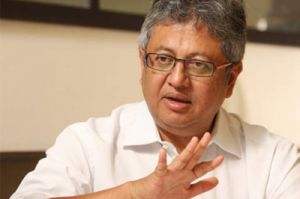Distribute the nation’s wealth
We could do with some of our politicians emulating the political beliefs of the late Tony Benn, who was a strong advocate of ‘nationalisation’.
Zaid Ibrahim, The Star
ANTHONY Wedgwood Benn, a colourful and charismatic intellectual giant who also happened to be a politician, passed away last month at the ripe old age of 88.
Few British politicians in the last century captured the public’s imagination like Tony Benn did.
Like many students in 1970s London, I thought he was inspiring.
People found solace in his speeches at a time when thousands lost their jobs every week, when workers waged war against their employers, when trains were not running and when London truly was bleak.
Even the present Conservative Prime Minister David Cameron admitted that his interest in politics started when he began reading Benn’s many speeches and writings.
Benn’s lifelong passion for politics came at the exclusion of everything else. His belief in the strength of ideas was refreshing and unusual, even for a mature democracy like Britain.
His detractors called him names like “maverick”, “idiotic” and “liar” but almost everyone, including those who loathed him, agreed that he was a voice they could not ignore.
His central political belief was that political power is not just about winning elections but about changing people and society.
Politics must be able to sufficiently empower the people so they can help shape policies and share in the wealth of the country. Fairness in society can only be achieved when power is shared evenly.
Democracy means nothing if the power of politics does not rest with a country’s people. Benn was distrustful of big corporations, financial conglomerates, free markets/free trade and global capitalist institutions like the International Monetary Fund and the World Bank.
Although born and raised within the elite class, he renounced his peerage in the House of Lords and chose instead to be a common politician.
We could do with some of our politicians emulating Benn’s political beliefs. When our Government implemented the minimum wage policy there were doubters, even in the ruling coalition.
These doubters are usually from the wealthy class. They spoke of potentially adverse side effects of such a policy, like inflation and the possibility of scaring investors away.
They kept asking for exemptions from the Human Resources Ministry and gave all sorts of excuses to postpone the policy’s implementation.
If these politicians had a stronger commitment to helping ordinary people earn a decent wage, then the policy could have been implemented more effectively and without much fuss. After all, this is a minimum wage policy, not even a living wage policy!
Benn was known to be a strong advocate of “nationalisation”, but this must be understood in the right context.
At that time he was fighting for the spoils of North Sea oil against the major oil companies.
He wanted a fair share for Britain and he threatened them with nationalisation when necessary.
He wanted the banks to be more sympathetic to the small borrowers, but they were not helpful.
In our country, leaders must also weigh in on the activities of big conglomerates and multinationals so that the benefit can be distributed fairly to the people.
When the Government talks of selling some of the government-linked companies (GLCs), I hope the leaders will be cautious. It’s true that the Government does not always know the best way to maximise profits but their responsibility to the people requires them to continue to be involved in business.
Profitability is important because it’s a sure sign of efficiency and competency, but working for profit is neither the remit nor the aim of politics or responsible government.
Malaysia needs leaders who can inspire. This is an opportune time to unite the people of this country with a clear economic vision of how wealth can be efficiently distributed to all Malaysians without killing the goose that lays the golden egg.
In his 22 years in office, Tun Dr Mahathir Mohamad laid the foundation for wealth creation in this country. We are now a wealthy nation and we are still growing. We are in the top 12 in the list of the world’s fastest-growing economies. We are a balanced economy. In other words, we are a success story.
What is urgently needed however, is a mechanism to distribute the wealth of the nation.
Believers in Reagonomics and Margaret Thatcher’s admirers as well disciples of The Heritage Foundation will counter that we need to create wealth first before we can distribute it. Don’t be fooled by such propaganda.
The wealthy class, like the one per cent of Americans who own 42% of the country’s wealth, will never identify an opportune time to distribute wealth.
They will conjure some innocuous economic theory like “the trickledown effect”, but rest assured, little will reach the ordinary people without government interference.
Our leaders need to put in place policies that can be more effective in distributing the nation’s wealth.
This can be done by monetary or fiscal policies or through other means.
It can be done by GLCs playing their proper role to help the rakyat instead of focusing only on how much profit they are going to make.
If policymakers are prepared to be firm in their commitment to uplift the working condition of workers and lower-income groups, the Government can always devise policies that do not necessarily inhibit growth. They need to understand that political stability is not predicated on how wealthy our nation has become in Gross Domestic Product terms or other figures bandied about by the International Monetary Fund.
It depends very much on how the people feel the Government is treating them. It depends on how fair we are prepared to be in dealing with the common people of this country.


